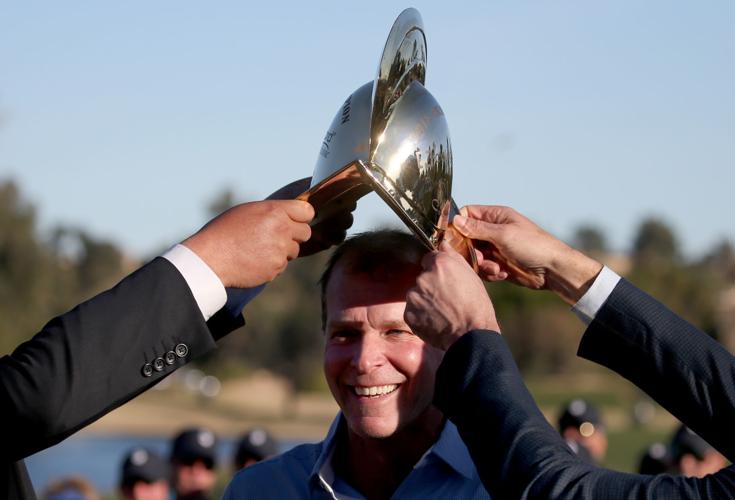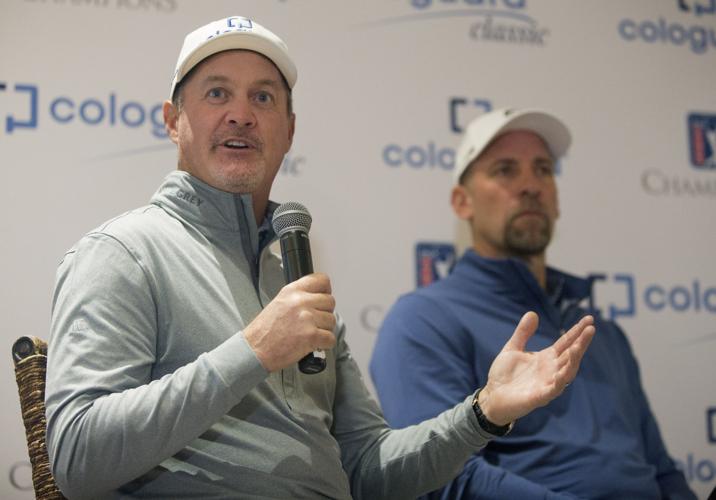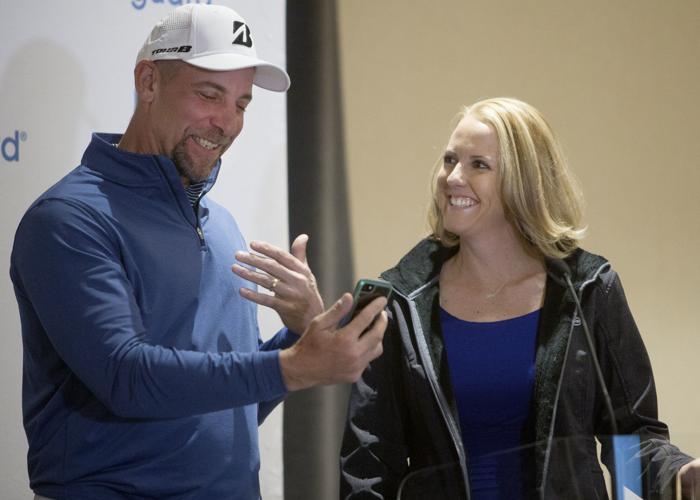When he finally won a PGA Tour Champions event last year — at the Cologuard Classic here in Tucson — Steve Stricker experienced the full gamut of emotions.
He was proud of his play, of course. He choked up a bit while addressing the crowd. But more than anything, he felt relieved.
Stricker had finished tied for third or better in five of his first seven starts on the Champions Tour, including his debut at Omni Tucson National Resort the previous year. With youth (relatively speaking) and recent success on the PGA Tour on his side, he was expected to win at least one of those. Instead, he repeatedly fell just short.
Stricker learned what so many others before him have come to realize: The Champions Tour is much more competitive than most casual fans think.
“You saw how much it meant to him, that first win,” said Jerry Kelly, Stricker’s close friend and competitor. “It’s a big thing. He realized how hard it was.”
Even if they’re purportedly past their prime, the regulars on the Champions Tour remain as competitive in their 50s and 60s as they were in their 20s and 30s. Unlike their hairlines, the desire to win never recedes.
Although it isn’t a pure apples-to-apples comparison, one could argue the Champions Tour is a more exclusive club than the PGA Tour. The latter awards 125 tour cards annually, giving those players exempt status. On the Champions Tour, the standard field size is 78. There are several ways to become fully exempt, but only the top 36 from the prior year’s Schwab Cup standings are guaranteed it.
“That’s pretty stout,” Kelly said. “It’s a difficult job out here.”
Kelly has learned that as well. He won his first event of 2018, the Mitsubishi Electric Championship at Hualalai, and had 10 subsequent top-10 finishes — but no additional victories.
The Champions Tour offers opportunities and challenges for weekly contenders, such as Kelly, and sponsor-exemption hopefuls, such as John Smoltz.
One has been playing pro golf for decades; the other is trying to squeeze what he can from the game after a 22-year MLB career.
They share a competitive drive that will be on display Friday-Sunday at the fifth Cologuard Classic.
Playing through
When he met with the Tucson media on Feb. 11, Kelly was fresh off a procedure to repair an elbow injury. How fresh? Kelly had it done that morning. He couldn’t use his right arm to shake hands.
It won’t stop him from playing in the Cologuard Classic, even if he has to wear one of those oversized Rob Gronkowski arm braces.
“I still had the tear in it when I took third at Mitsubishi,” Kelly noted, referring to this year’s season-opening event.
Kelly, 52, hurt his elbow while trying to play through a knee injury in late 2018.
“Because of my knee, I tore my elbow,” Kelly said. “I wish I had gotten this done the same time I got my knee done. Now I’m fighting through more stuff.”
Kelly plans to play anyway, and not just because he’s the spokesman for Cologuard. That’s his nature. Kelly played ice hockey in high school in Madison, Wisconsin. He thrives on adrenaline.
Kelly made his Champions Tour debut in 2017. He quickly discovered that the tour would satisfy his appetite for competition.
“When I go back to the PGA Tour, it’s kind of like vacation,” Kelly said. “When I come out here, I’m trying to win a golf tournament; I’m trying to win a season-long race. I’m fully engaged and fully into it.”
And fully aware of how hard it is to win.
Kelly typically waits until Champions Tour newbies have played two or three tournaments before hitting them with the line tour veterans used to sarcastically lay on him: “Pretty easy out here, huh?”
Kelly had that conversation with Darren Clarke, who made his Champions Tour debut in August 2018. Clarke — who has won 15 times worldwide, including the 2011 Open Championship — finished tied for 24th in the Boeing Classic. It was his best showing of the season.
“I can’t believe the scores guys are shooting,” Clarke said to Kelly.
Clarke now knows the secret.
“It’s really good golf,” Kelly said.
‘Competition addict’
Smoltz already has launched a successful second career. He’s the lead MLB analyst for Fox Sports. He does work for MLB Network as well.
But as satisfying as that job is, Smoltz has learned what so many other former players and coaches have come to find out about the booth. Even in the age of social media, which creates something of a digital scorecard, you don’t leave the stadium with a win or a loss. It’s one of the main reasons so many ex-coaches return to the sidelines.
Smoltz, 51, has found an outlet for what he calls his addiction to competition. It’s golf.
“From a professional, competitive standpoint, the broadcast booth is the next-best thing. But it does not replace what you did for your career,” Smoltz said. “When you play professional anything, you’re a competition addict. It’s what drives you.
“I take my job very seriously. I work as hard as you can work to be prepared. But nothing is as exciting as what I’m about to do.”
Smoltz received three sponsor exemptions for Champions Tour events this year; the Cologuard Classic will be his first stop. It won’t be his first appearance in a Champions Tour event.
Smoltz qualified for last year’s U.S. Senior Open — a feat he considers his greatest individual accomplishment. Smoltz didn’t make the cut, shooting rounds of 85 and 77. But as he did throughout his baseball career, he embraced failure and used the experience as an opportunity to learn.
“I wasn’t ready for that event,” Smoltz said. “But I learned so much about me through that, and it has put me in position to be a better golfer. I understand what comes with it.”
Smoltz jots down notes after every tournament in which he plays. (He won the celebrity portion of the Diamond Resorts Tournament of Champions last month.) He’s realistic about his chances in Tucson. But he’s in constant competition with himself, and that will never change.
“I’m not pretending I can pull off miracles,” Smoltz said. “But I’m also not pretending that I can’t play golf. I can play golf.”






